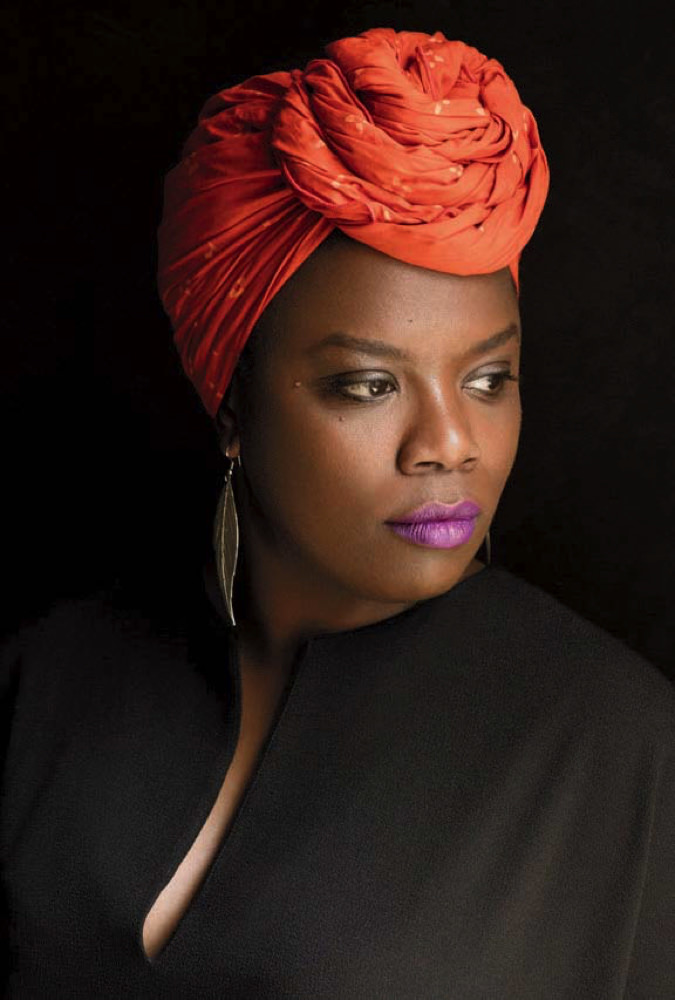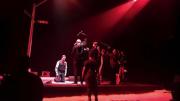Antoinette Nwandu ’02 has a lot to say. Dressed for battle in the Brooklyn writer’s uniform—sunglasses, leather jacket, boots that clip the pavement—she walks as she talks, unintimidated by uncharted destinations.
Exploratory dialogue is the métier of any good playwright, and Nwandu is very good. Her break-out hit, Pass Over, was hailed for its linguistic signature: languid volleys and rapid-fire wordplay, straddling black vernacular, Beckettian deconstruction, and Biblical prophecy. A reinterpretation of Waiting for Godot for the era of Michael Brown and Trayvon Martin, the play centers on two young black men who pass their days and nights pinned—by metaphysics, fate, or oppressive social structures—to a street corner. Then tragedy strikes.

Antoinette Nwandu
Photograph courtesy of Antoinette Nwandu
During an afternoon hour, Nwandu’s own speech will jump from Beckett to the Kardashians, from church pews to Soul Cycle, from Toni Morrison to the Goonies. She’ll plumb her own history and aspirations, and the core of her artistic mission, even as she reflects on why Instagram makes her so uncomfortable. She is a master bridge-builder between high and low art—or, more to the point, she makes an art of rejecting the distinction.
Although she says, “Change is very slow for me,” it becomes clear, as she begins to describe her current projects, that some kinds of change have come on quite suddenly. “Nothing, nothing, nothing, nothing, and then a few things at once,” is how she describes her career trajectory so far.
The “few things” include a screenplay for Amazon Studios, an adaptation of Nafissa Thompson-Spires’s short story “Wash Clean the Bones.” As Nwandu’s first paid studio-writing job, the project has meant learning the industry ropes, on top of adjusting from the stage to the screen. She has another screenplay in the works, as well as a TV show in development with Annapurna Pictures, both in the early stages. And then there are the plays: yet another commission, this one for “a fairly large institution” in the theater world. Meanwhile, she is working through rewrites of her newest play, Tuvalu or, The Saddest Song, for its forthcoming premiere at Manhattan’s Vineyard Theater.
Graduating from New York University’s Tisch School of the Arts with an M.F.A. in playwriting on the brink of the 2008 financial crisis was her stark awakening to the economic realities of theater; Pass Over marked the light at the end of a long tunnel. The play was first performed in 2017 by Chicago’s Steppenwolf Theatre Company and ignited some controversy and excitement. It earned a second run, at Lincoln Center, but it was Spike Lee who accelerated Nwandu’s growing career. He filmed one of the performances for Amazon Studios, making Nwandu a Writer’s Guild of America-eligible screenwriter, and then invited her to write for his Netflix show, She’s Gotta Have It, based on his 1986 film of the same name. Now, Nwandu says, the question is: “Do I like being the sort of person who has a normal life for a little while and then does a big thing, or do I like being the sort of person who has a few big things going at the same time?” But that’s mainly rhetorical: like it or not, big things are happening.
She never meant to be a playwright or a screenwriter. She grew up in Los Angeles in the 1980s, raised by a single mother in a fundamentalist Baptist church that Nwandu now considers a cult. She speaks frankly about the aftershocks of her upbringing. Theater was nonexistent; television and movies were tightly controlled. The process of coming to the theater—at Harvard as an English concentrator and beyond—coincided with eradicating the authoritarian voices that had filled her head.
Looking back, she describes her earlier work, including Pass Over and its predecessor, Breach, as attempts to use theater as “therapy.” (Breach presents a young writer-teacher trapped between competing expectations and struggling to forge her own identity.) She stands by those plays, and the version of herself who wrote them, but now sees them as “masochistic” at the root, she says. “I’ll never hurt myself to make art again.”
But Nwandu’s childhood also bequeathed her artistic instincts: the theatrics of the church, the particularities of her family dynamic, and the ideas of ’80s popular television. And she remains interested in autobiography, if not in reopening old wounds: the protagonist in Tuvalu is a black woman looking back on her adolescence in Los Angeles, amid the O.J. Simpson trial and violence in her own home. Now, Nwandu says, the challenge is to marshal those elements to leave the audience with something more than a reiteration of pain.
The current political moment sharpens the urgency of that challenge. Living through what she calls “the day-by-day formation of a fascist state” has given her a new mission: to build community through storytelling and create a space to heal. For Nwandu, television, especially in the era of streaming, presents an unparalleled opportunity to experiment and to speak to a diverse America that exists nowhere in physical space. “I’m not asking people to forget their hatred as a way of glossing over it, but to engage with their hatred as a way of letting it go.”
But for transformative emotional journeys through storytelling, Nwandu believes theater remains the place where it’s truly possible for humans to really connect. In her words: “We are meat packets who need to sit next to other meat packets sometimes, at a very basic level.”
In Tuvalu, Nwandu meditates on the notion of apocalypse. What happens after the worst happens? What new kinds of relationships and realities become possible in the wake of true disaster? But for the moment, in the midst of intensive rewrites, she can’t be much more specific than that. “I just don’t want to pin it down yet, even for myself.”










